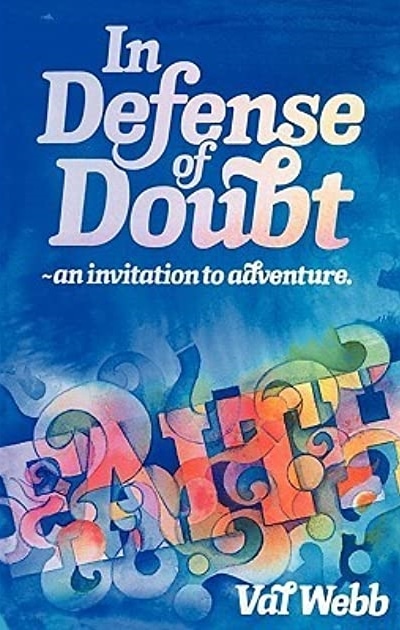Today’s Author: Carol Swanson
In her sermon, Pastor Betsy made a reference to the label “Doubting Thomas,” and that is “a bad rap,” undeserved. She shared that Thomas “is an experiential learner and wanted to see and to touch, to use his own senses, to be in the presence of Jesus who is so important to him.” I agree!

But I also think that Doubting gets a bad rap.
Some years ago, here at Prince of Peace, some of us were in a book discussion: In Defense of Doubt—an invitation to adventure, by Australian theologian, Val Webb. Faith is about trust and relationship. And belief is about dogma or interpretation. Doubt is not the opposite of either, Webb says, “but a discrepancy between ‘faith’ and ‘belief.’… Doubts occur when the belief system does not line up with our experience.” (p4) Doubts “are the grains of sand that irritate the oyster until the itching produces a beautiful pearl.” (p3) When we feel uncomfortable with certain belief claims, perhaps it is God nudging us in a new direction, an “adventure into which God lures us.” (p108)
When I was thinking of this devotion on Doubt, I thought again of the question, How do we make sense of the cross? There are those who would say the cross was always God’s plan to save us. Atonement theories in church history say God required Jesus to die on the cross as a ransom to the devil. Or that God as a righteous Judge or dishonored King who demanded the death penalty for our disobedience. Jesus, the perfect human, Son of God, became the substitute, the sacrificial victim, in our place.
Those theories quit making sense to me many decades ago. Doubt swept them away. Accusing voices naming them abusive and violent ring true to me. Instead, I want to experience a God of Love and Grace. For God so loved the world that he gave his only Son… a baby who grew into a man who wanted to show us how God works in the world, how to be in loving relationship with God and with one another. It was the politics of the temple and the Roman government who were responsible for Jesus’ death. It was God who raised Jesus to victory over death. As Webb writes, “Doubts are not red flags indicating weakness but are auditors of our belief systems. …When successive bottoms fall out of successive doctrines that no longer fit our cultural and scientific worldviews, one does not ‘lose one’s faith’ by asking questions.” (p7)
Something else occurred to me today when I came home from church following the adult forum on Christian Nationalism. It makes this devotion long, but I’d like to share it. Perhaps it was a nudge from God—I believe in such nudges. Anyway, I found Marcus Borg’s book, The Heart of Christianity: Rediscovering a Life of Faith (c.2003), on my shelf and started reading. It immediately echoed some of the things our presenters Nancy and Rolf said. I quote from Borg’s preface titled “What Does It Mean to Be Christian Today?”
“What is the heart of Christianity? What does it mean to be Christian today? In this book, I describe two quite different answers to this question. The first is an earlier vision of Christianity; the second, an emerging vision. Both are present in the churches of North America today, deeply dividing Christians. We live in a time of conflict and change in the church. …
“For the past few centuries, this earlier way of seeing Christianity, what I call an ‘earlier paradigm,’ has been shared in common by most Christians in Western culture. It remains a major voice within North American Christianity, perhaps still the majority voice….This earlier way of being Christian views the Bible as the unique revelation of God, emphasizes its literal meaning, and sees the Christian life as centered in believing now for the sake of salvation later—believing in God, the Bible, and Jesus as the way to heaven. Typically, it has also seen Christianity as the only true religion.
“The second way of seeing Christianity, the ‘emerging paradigm,’ has been developing for over a hundred years and has recently become a major grass-roots movement within mainline denominations. Positively, it is the product of Christianity’s encounter with the modern and postmodern world, including science, historical scholarship, religious pluralism, and cultural diversity. Less positively, it is the product of our awareness of how Christianity has contributed to racism, sexism, nationalism, exclusivism, and other harmful ideologies.
“This book seeks to describe this emerging way of seeing Christianity. It is written primarily for people for whom the earlier vision of Christianity no longer works. In this time of change and conflict within the church, what is the heart of Christianity? What is most central to an authentic Christianity and Christian life today?”—An important question for each of us.
Gracious God, bless our faith journeys, bless our doubts and lead us in renewing directions. Give us wisdom and discernment to follow the way of Jesus who seeks peace and healing for this world. Amen.
